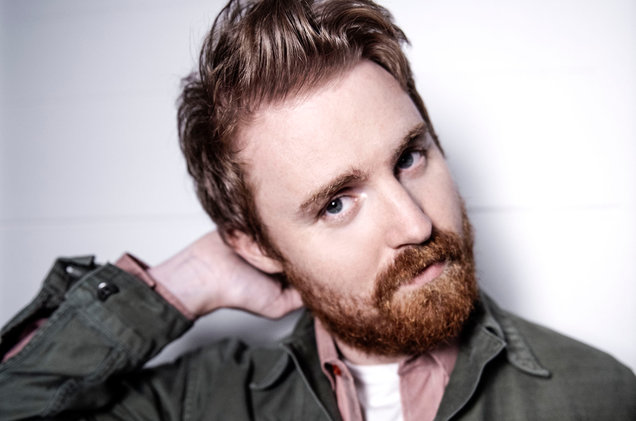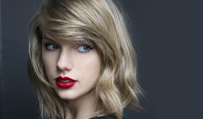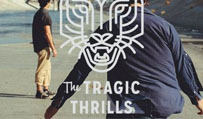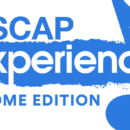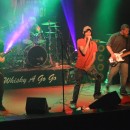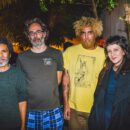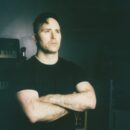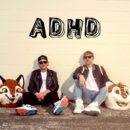It’s been an enormous couple of years for Los Angeles-based electronic trio Cheat Codes. Composed of DJs and producers Trevor Dahl, Matthew Russell and Kevi (real name Kevin Ford), the group put out the Level 1 EP in 2018 and followed it, appropriately enough, with Level 2 the following year. In between, they’ve collaborated with a variety of high-profile artists including Demi Lovato (“No Promises”), Little Mix (“Only You”) and Nicky Romero (“Sober”).
The track “Who’s Got Your Love?” from the Level 2 EP took things, quite literally, up to another level. A collaboration with Irish producer, singer and DJ Daniel Blume, the song pulled in over four billion streams and reached #1 on the dance charts. With a very contemporary EDM sound and a gift for polished flair, it’s fair to say that things are going very well as the group comes off of a well-received tour with Steve Aoki and prepares to release their debut album, as well as the Level 3 EP. We spoke to Dahl and Russell about all of that, and so much more...
Music Connection: The band formed in 2014 and started releasing music a year later––what was the mission at the beginning?
Matthew Russell: The background was, we were all on different individual projects and we felt like we were being put into a box a little bit, so the idea of this project is we wanted to do an electronic, DJ project with the mentality of a producer––that we can pivot to any kind of sound that we wanted to. If you listen to the music from 2015 up until 2020, it’s been extremely different every single year. We have different sounds that we experiment with. That was the main idea, and then the name is all about doing what you want, going straight for what you want, not what society dictates. We always try to find the cheat code.
At the beginning of the group, we were doing everything ourselves––recording our own vocals, singing, mixing, mastering, producing the tracks. I made the logo. We were making the beats, recording live guitar––we were doing everything. That was our cheat code, and our goal was to put out a song every single month. We were able to do that because we were doing everything ourselves, so it would cost us like $50 to put out a song.
Our whole mentality is just like, doing what you really want and not doing what you think you’re supposed to do. And always making the most of what you’ve got in any situation. Finding the cheat code in those situations.
I think a lot of people have the mentality of, “Well, if I get this amount of money or this connection, then I can go after what I want.” But in reality, you’ve just got to go for it.
MC: Your sound has evolved over the past five years––what influenced that evolution?
Russell: For me it’s boredom. If we feel like we’re bored with songs that we’re making, then we need to switch it up, because it needs to be fun for us, and I think a lot of people might stick to what works when they’ve found a sound, and that’s great. That works for a lot of artists. But I think I would just lose my mind if I had to play a song on stage for like 10 years and keep making the same song over and over again.
Trevor Dahl: When we came to this project we wanted to be able to blend all sorts of different genres together, to be able to switch it up and not be too stagnant. We all came from different backgrounds; I did acoustic music before, Matt did rock, pop and hip-hop, and Kevi did urban stuff. So we came from different styles and backgrounds, and when we came together we wanted to be able to switch it up whenever we felt like it, and it’s definitely evolved into our thing. For instance, we did a song with Demi Lovato, and then the next one was with Trippie Redd and blackbear. So we like to switch it up and not stay in one place.
Russell: In the background of doing a producer/DJ project is also the idea that we don’t have to sing on the songs if we don’t want to. We can make a song, and maybe it doesn’t fit our personal singing voices so we can reach out to other artists and just make something that we would have never made on our own or vice versa. So we have unlimited options and that’s what we love about the project.
MC: Does the technology dictate the art? And are there limits to what it can achieve?
Russell: Not so much. Obviously, in the last 15 years, technology has given us a lot more room to create whatever we can envision––I guess in a sense. But it’s almost to the point that everything you can possibly imagine is almost at your fingertips, so it’s a matter of being creative and putting your own twist on things.
MC: You’re based in LA, correct? What do you think of the current Los Angeles electronic music scene? How often do you guys perform in Los Angeles?
Russell: Honestly, we tour every weekend. We probably play LA maybe three times a year. Maybe more if there’s a special event or something. So we’re not playing LA or hitting the clubs every weekend.
I would say, in some of the major cities like LA and New York, there’s a lot going on so there’s a lot of distractions. I almost feel like other cities, whether it’s Miami or whatever, when you’re traveling every weekend you find these pockets of fans that are diehard and are so excited to see you. So excited that there’s a show in their town, and sometimes those are some of the most fun shows to play. You play these grungy small clubs, but they’re having the best time in the world. Sometimes, those are the best cities.
But LA in particular, as a scene, I think is great because it always seems to be on the cutting edge as far as new music, and you’re going to hear it first. That’s why we live in LA, because we want to be able to work with new, upcoming songwriters or artists, or even just fashion as far as being inspired by different visual artists. So I think creatively in general, LA is a very inspiring place to be.
MC: You’ve released two EPs so far––Level 1 and Level 2. Is that the way to go in the digital world? Is it even worth releasing full-length albums anymore, especially for electronic music fans?
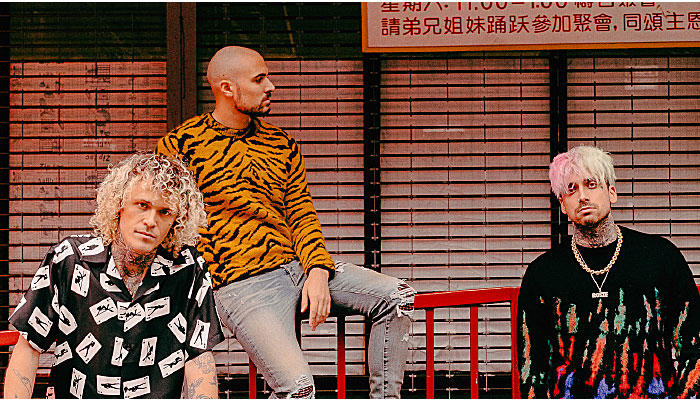
Dahl: Even though we haven’t done an album, we’re actually thinking albums are coming back. People crave a body of work from artists they love and not just the one tune. They’re waiting for more. A lot of my favorite songs from artists aren’t necessarily the singles. They’re maybe the b-sides and the songs that don’t get 20 million streams, but they tell more of a story and tell me more about the artist. We want to start getting to that more, so we’re thinking about our first album right now, which we’re pumped about. Five years of making singles and EPs, so we’re happy to be making a full body of work, which has been awesome.
We’re also working on Level 3 as well, so we have a shitload of music lined up.
MC: Does your deal with 300 Entertainment allow you that sort of freedom, to release music as and how you wish?
Dahl: Yeah. We were lucky enough when we were making the deal with them that we were able to build it out where we can release music whenever we feel like it. So we have a partnership with them where we can release music and not be stopped by anybody, so it’s good.
MC: How about your management team––do you feel like you have supportive people working with you?
Dahl: We have a couple of management teams, but YMU is the big company and then Red & Gold.
Russell: We have a company based in the UK, as it’s good to have feet on the ground over there. We do a lot of collaborations there––we just did a song with Liam Payne. So it’s good to connect with labels out there, because we usually have a different international label partner when we put out music physically. Then we have the other two companies focusing on different things, whether it be touring and the other one focusing more on keeping in with the US label, keeping on our releases, A&R-ing and stuff like that.
Dahl: We used to have the one company in the US and it was cool but we thought we were limited a little bit with our resources and having things going on internationally. The teams actually work together and they still work together on other projects as well.
MC: Obviously you’ve worked on a lot of collaborations––is that a process you enjoy?
Dahl: Absolutely, yeah. It’s kinda why we went into it. Like Matt said, we get bored. So being able to go from Demi Lovato to Trippie Redd, to be able to work with completely different styles of music but still some of the biggest names out there––it’s interesting being able to do that, finding out how different people work and how songs are made. How to create something special.
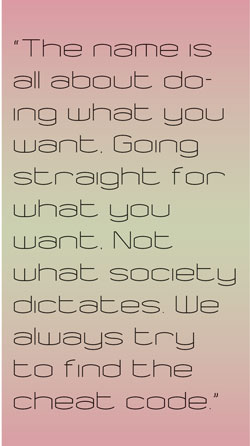
MC: Do you have a favorite?
Dahl: I think the new one with Trippie Redd, Prince$$ Rosie and blackbear, “No Service in the Hills.” I’ve been excited about this one for a while. The fact that it’s all come together and everyone’s ready to go, I’m excited.
Russell: I’d probably say “No Service” too. We’ve had this record for over a year, so it’s pretty exciting that it’s coming out now. Going back to what you said, the pro and the con of collaborating is you’ve got to work on different people’s schedules and stuff like that, but you’re always gonna get something new that you wouldn’t have made on your own, because you’re getting those influences from the other artists.
Trippie Redd came in and just wrote, put his entire spin on the record. blackbear came in later and he rewrote the hook in his own swaggy perspective, bringing in some lyrics that we would have never come up with on our own. It’s interesting––I think to collaborate as much as we do, you have to be really open-minded. It’s fun for us, because it feels like you’re learning, not getting stale or bored, which is important.
MC: How much time do you spend in a room with them, or is it all done electronically?
Dahl: It’s different for every artist. In 2020, a lot of it is via the internet or friend-to-friend. blackbear, for example, is really good friends with one of our good homies, so that’s how that one worked out. Demi, we were in the studio with her, doing her vocals, going back and forth on how to do whatever we’ve got to do to make it better. It was awesome. So every artist is different, everyone has a busy schedule. Luckily the internet is a pretty great tool.
MC: You’ve managed to reach four billion streams on YouTube––how do you do that in this saturated market?
Dahl: I think the biggest thing is we’ve always tried to put our best foot forward. We’re constantly working on new ideas––if you have 100 ideas, pick your favorite 10 and then put your favorite one out first. It’s all a matter of working, working, working and putting your best foot forward. When you do that, you really maximize on every possible chance you have to make things bigger––to make every song bigger than the last one. That’s the mentality you need to have, as far as making everything better every time you do something.
MC: “Who’s Got Your Love” reached #1 on the dance charts. Were you surprised by the success?
Dahl: For me, it’s hard to expect anything, ever. Like I say, it’s just a matter of wanting to put out our favorite song that we have out at that time. Whatever we’re really excited about. That song, for example, is my favorite song on the Level 2 EP, so I was pumped about that one and I thought that would have the biggest chance of doing well, so I’m glad that it did.
Russell: Yeah. It recently got placed on this big UK reality show called Love Island, so people have been Shazaming it and stuff. Me and my girlfriend watch that show all the time.
Dahl: You never know where a song is going to fit or just end up, and how people are going to hear it or experience it. It’s always different. It’s never just the same formula.
Russell: That song is fucking perfect for Love Island, though. They’ve used like four of our songs.
MC: You worked with Daniel Blume on that one…
Russell: Shout out to Daniel Blume. He’s the man. We met him through a Twitter DM, and he said he’d love to collaborate with us one day. He sent us a few songs and we thought they were awesome so we kept in contact. He was like 15 or 16 at the time, super young, and we eventually found an idea that we could do together. This was it. It’s kinda crazy.
MC: How did the songwriting process work on that one?
Russell: He had the vocal idea and then it went back and forth with the production. I sang the lyrics to the second verse, he did the formatted vocal, then we bounced it back and forth until we were all happy, via the internet.
MC: What would be your dream collab?
Dahl: As far as anybody in the world, I got into music because I love The Beatles, so it’d have to be Paul McCartney, even though I have no idea what that would sound like, but that’s the beauty of the way we make music. Something like that would be unreal.
Russell: It’d be cool to do a song with Empire of the Sun.

Dahl: If Kevi was here, he would say Drake, so I’m going to pop that in for him.
MC: How much work goes into your live show?
Russell: We’re actually working on our live show right now where we’re incorporating live instruments––Trevor playing guitar and me playing bass. We have a drummer and potentially keys.
Dahl: It still feels very much like an electronic set, DJ oriented, but we wanted to create special moments to show that we have more musical ability than just DJing––we play instruments. We want to have a little more fun and jam out. Creating moments like that separates us from everyone else.
MC: What does the band have coming up in 2020?
Dahl: We’re about to tour, hitting pretty much everywhere in the States. We’re doing a show in Mexico, in Dubai, so we’ll be really busy in February. We’re booking shows for the spring and summer right now, and then we’re working on a live show that we’re hoping to perfect by the fall and winter and then at the same time finishing up the Level 3 EP and our debut album. It’s going to be a really busy year, but we’ve been working on a lot of this stuff for a while so we’re trying to put the finishing touches on everything and show it to the world.
Contact Koko Black, koko@threehundred.biz
Photos by Grace Rivera

